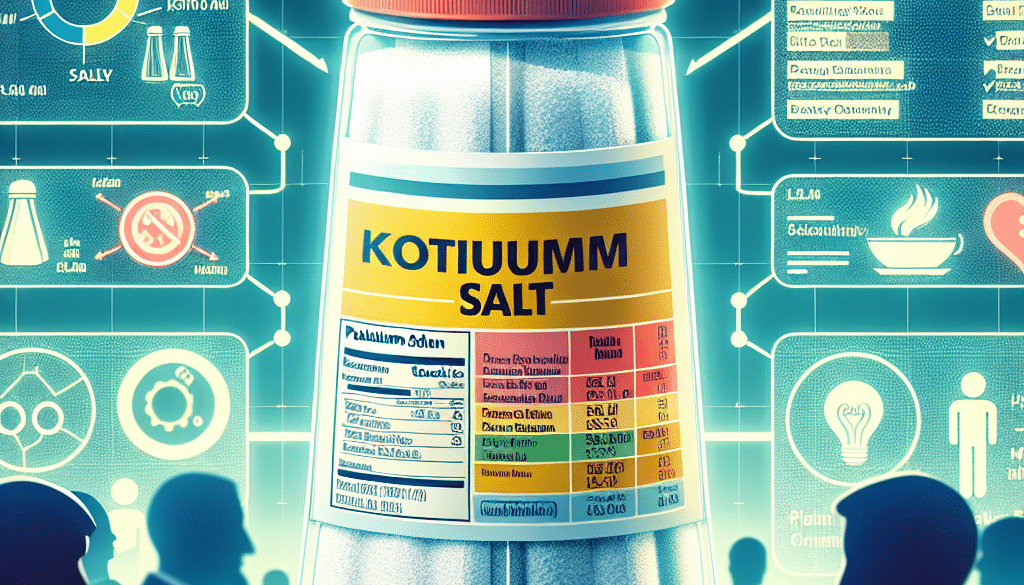FDA Takes Strides to Make Potassium Salt More Label-Friendly
-
Table of Contents
- FDA Advances Potassium Salt Labeling for Consumer Clarity
- The FDA’s Initiative on Potassium Salt Labeling
- Understanding Potassium Salt and Its Health Benefits
- Case Studies and Statistics: The Impact of Potassium Salt
- Challenges and Considerations in Adopting Potassium Salt
- Conclusion: Embracing Potassium Salt for a Healthier Future
- Discover ETprotein’s Premium Protein Products
FDA Advances Potassium Salt Labeling for Consumer Clarity

In an effort to promote healthier dietary choices among Americans, the U.S. Food and Drug Administration (FDA) has taken significant steps to make potassium salt—a healthier alternative to traditional sodium chloride (table salt)—more accessible and label-friendly for consumers. This move is part of a broader initiative to combat chronic health issues such as hypertension and cardiovascular disease, which are often exacerbated by high sodium intake. By understanding the FDA’s actions and the benefits of potassium salt, consumers can make more informed decisions about their dietary habits.
The FDA’s Initiative on Potassium Salt Labeling
The FDA recognizes the need to reduce sodium consumption and has identified potassium salt as a viable substitute that can help Americans maintain a healthier diet. Potassium salts, such as potassium chloride, offer a similar taste and functionality to sodium chloride but with the added health benefit of potassium, an essential nutrient that many Americans lack in their diets.
To encourage the use of potassium salt as a sodium substitute, the FDA has proposed changes to food labeling regulations. These changes aim to allow manufacturers to use the term “potassium salt” in the ingredient list on food labels, rather than the less consumer-friendly chemical name “potassium chloride.” This move is expected to enhance consumer understanding and acceptance of potassium salt as a healthy alternative to traditional salt.
Understanding Potassium Salt and Its Health Benefits
Potassium salt is derived from potassium, an essential mineral that plays a crucial role in various bodily functions, including muscle contraction, nerve function, and fluid balance. Unlike sodium, which can raise blood pressure, potassium helps to counteract the effects of sodium and can aid in lowering blood pressure. The inclusion of potassium salt in the diet can contribute to the following health benefits:
- Reduced risk of hypertension and stroke
- Improved heart health
- Better fluid balance and kidney function
- Enhanced muscle and nerve function
By substituting potassium salt for sodium chloride, consumers can enjoy these health benefits without significantly altering the taste or quality of their food.
Case Studies and Statistics: The Impact of Potassium Salt
Several studies have demonstrated the positive impact of increased potassium intake on public health. For example, research published in the “Journal of the American Heart Association” found that substituting potassium salt for regular salt in food products could prevent tens of thousands of cases of cardiovascular disease each year. Additionally, the World Health Organization (WHO) has endorsed potassium salt as a strategy to reduce sodium intake and improve heart health globally.
Statistics from the Centers for Disease Control and Prevention (CDC) indicate that the average American consumes more than 3,400 milligrams of sodium per day, which is well above the recommended limit of 2,300 milligrams. By making potassium salt more label-friendly, the FDA aims to help consumers easily identify and choose products that can contribute to a healthier sodium-to-potassium ratio in their diets.
Challenges and Considerations in Adopting Potassium Salt
While the benefits of potassium salt are clear, there are challenges and considerations that manufacturers and consumers must take into account. These include:
- Taste and flavor adjustments when substituting sodium chloride with potassium salt
- Potential health risks for individuals with kidney disease or those taking certain medications that affect potassium levels
- Cost implications for manufacturers in reformulating products
- Consumer education and acceptance of potassium salt as a healthy alternative
The FDA’s efforts to make potassium salt labeling more consumer-friendly will play a crucial role in addressing these challenges and promoting widespread adoption.
Conclusion: Embracing Potassium Salt for a Healthier Future
The FDA’s strides in making potassium salt more label-friendly represent a proactive approach to improving public health. By simplifying the labeling of potassium salt, the FDA is helping consumers make more informed choices that can lead to reduced sodium intake and improved overall health. As awareness grows and more food manufacturers incorporate potassium salt into their products, we can expect to see a positive shift in dietary patterns and a decrease in sodium-related health issues.
For those looking to enhance their health and wellness through dietary supplements and protein products, ETprotein offers a range of high-quality options. Their organic bulk vegan proteins and L-(+)-Ergothioneine are ideal for individuals seeking non-GMO, allergen-free alternatives to support their nutritional needs.
Discover ETprotein’s Premium Protein Products
ETprotein is committed to providing consumers with the highest quality protein products that cater to various dietary preferences and health goals. Whether you’re looking for plant-based protein powders or specialized supplements, ETprotein has a solution for you. Their extensive product range is designed to meet the needs of the food and beverage industry, sports nutrition, weight management, dietary supplements, and more.
To learn more about ETprotein’s offerings or to sample their products, reach out to them at sales(at)ETprotein.com today.
About ETprotein:
ETprotein, a reputable protein and L-(+)-Ergothioneine (EGT) Chinese factory manufacturer and supplier, is renowned for producing, stocking, exporting, and delivering the highest quality organic bulk vegan proteins and L-(+)-Ergothioneine. They include Organic rice protein, clear rice protein, pea protein, clear pea protein, watermelon seed protein, pumpkin seed protein, sunflower seed protein, mung bean protein, peanut protein, and L-(+)-Ergothioneine EGT Pharmaceutical grade, L-(+)-Ergothioneine EGT food grade, L-(+)-Ergothioneine EGT cosmetic grade, L-(+)-Ergothioneine EGT reference grade and L-(+)-Ergothioneine EGT standard. Their offerings, characterized by a neutral taste, non-GMO, allergen-free attributes, with L-(+)-Ergothioneine purity over 98%, 99%, cater to a diverse range of industries. They serve nutraceutical, pharmaceutical, cosmeceutical, veterinary, as well as food and beverage finished product distributors, traders, and manufacturers across Europe, USA, Canada, Australia, Thailand, Japan, Korea, Brazil, and Chile, among others.
ETprotein specialization includes exporting and delivering tailor-made protein powder and finished nutritional supplements. Their extensive product range covers sectors like Food and Beverage, Sports Nutrition, Weight Management, Dietary Supplements, Health and Wellness Products, and Infant Formula, ensuring comprehensive solutions to meet all your protein needs.
As a trusted company by leading global food and beverage brands and Fortune 500 companies, ETprotein reinforces China’s reputation in the global arena. For more information or to sample their products, please contact them and email sales(at)ETprotein.com today.














